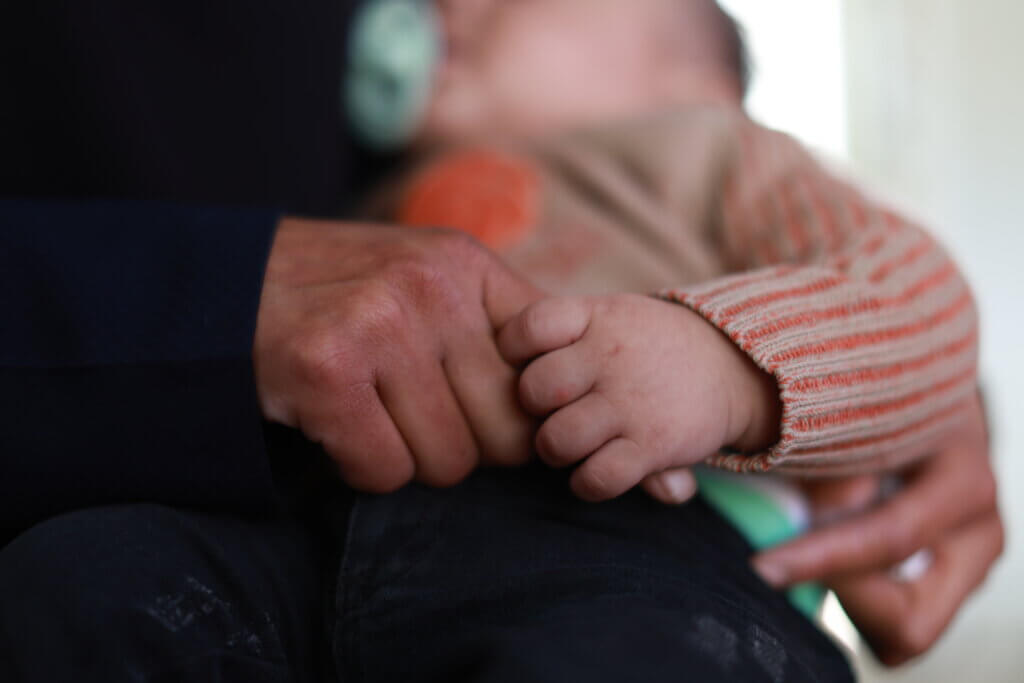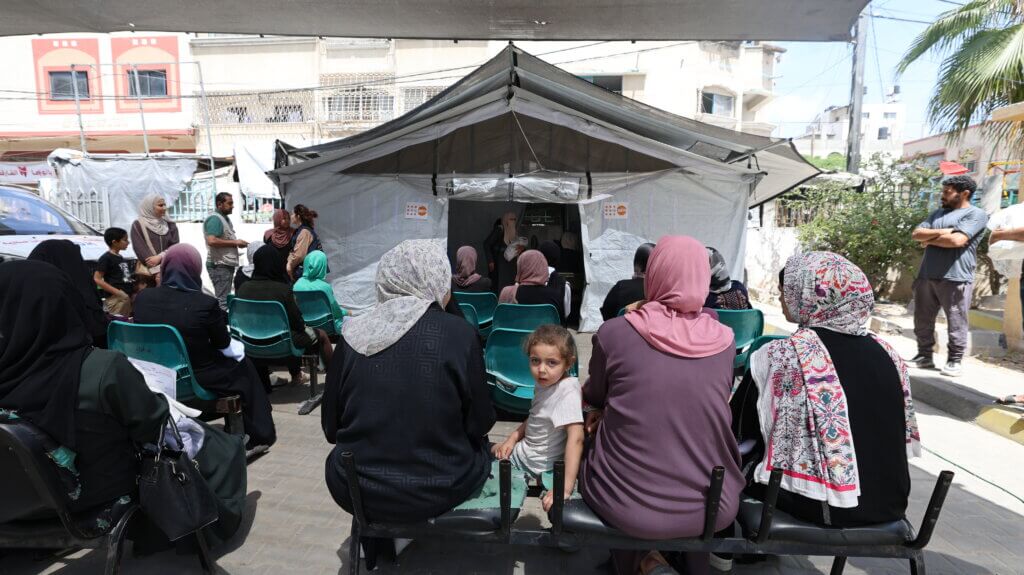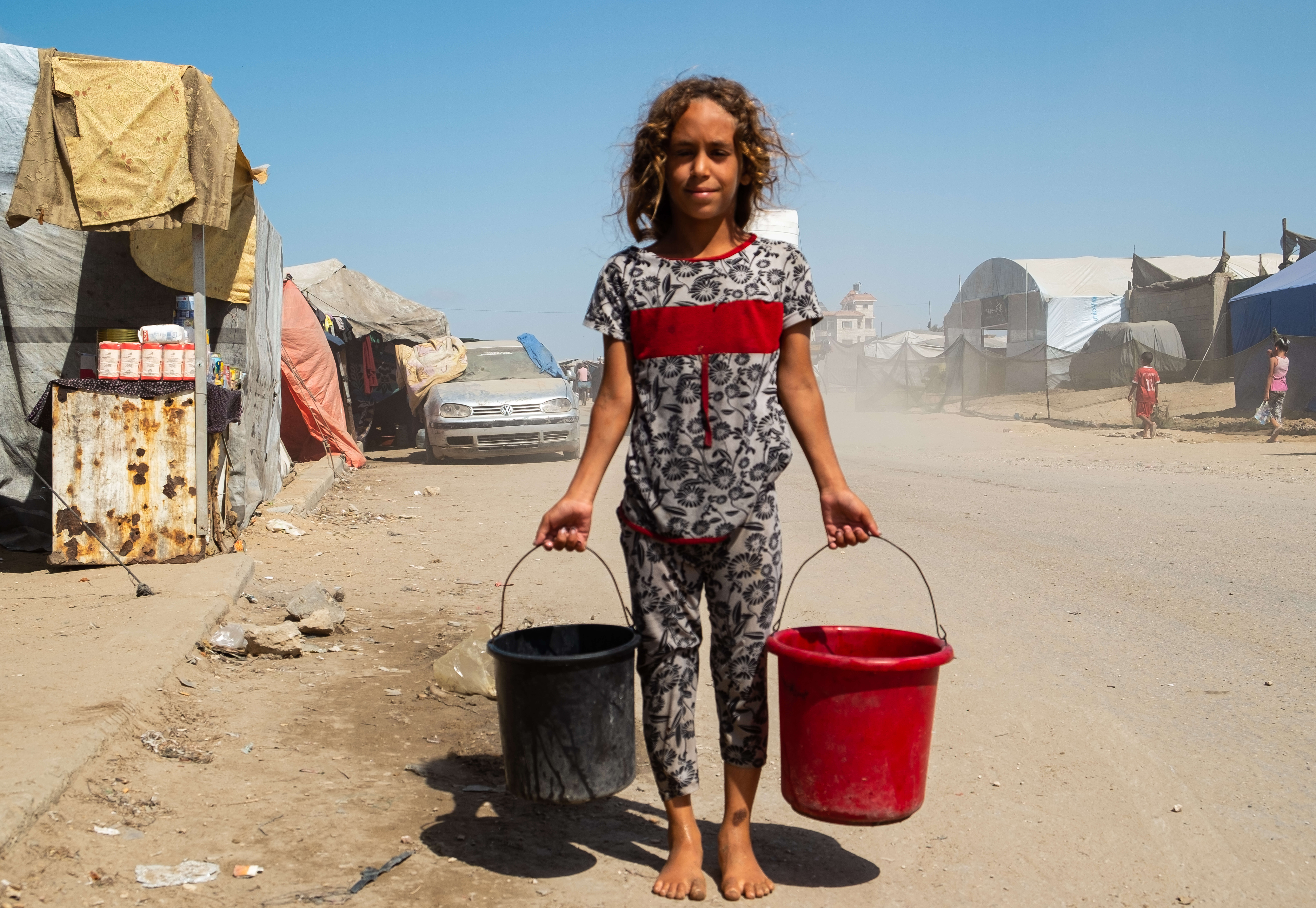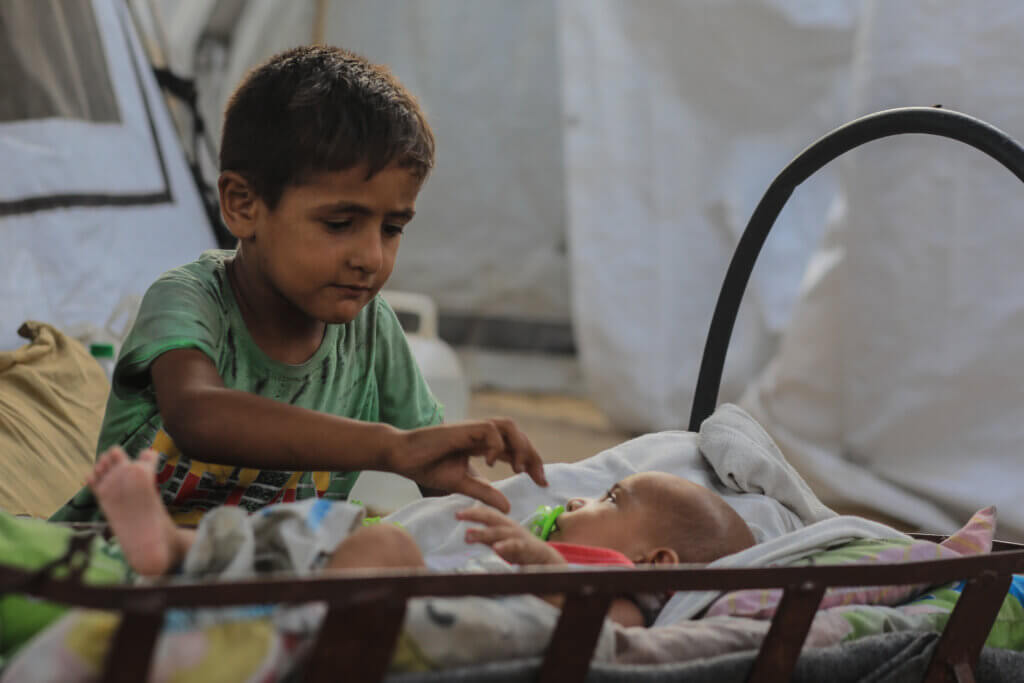Two Years of War in Gaza: Mothers, Newborns, and a Health System on the Edge as a Fragile Ceasefire Takes Hold

“The labor pains hit me at 4 am, but there was no one to help. I felt it might end with my death, and the death of my unborn baby.”
When her labor began, Yasmeen, a midwife in Gaza City, knew what she would have to do. While her husband rushed out to seek help, looking for an ambulance or anyone who could help get Yasmeen to the hospital, she braced herself for delivery.
“I asked my children to put a mattress on the floor. I had no painkillers. But I had no choice but to deliver my own baby.”
Yasmeen understood the risks associated with childbirth in Gaza all too well. After two years of acute hunger, displacement, and violence, one in three pregnancies in Gaza is now high-risk, and women are more than three times more likely to miscarry or die. Yasmeen knew that, if something went wrong, there was little she could do without equipment or a team to support her.
“My little children were crying in terror as I was suffering in front of them. I didn’t know what would happen to me in the next few minutes.”
Yasmeen is not the only one in Gaza that has had to deliver a baby without medical support. With only 15 health facilities currently able to provide maternal health and newborn care in Gaza, four of which are in Gaza City, every single facility is overwhelmed with patients and facing shortages. Even the hospital Yasmeen worked at, Al-Shifa, was damaged so severely that the maternity ward was rendered inoperable.
She felt fear, but then: “I grabbed his head and body and felt all the sounds stop; I could only hear my baby’s voice and my own.”
Yasmeen was able to safely deliver her baby and avoid tragedy—but too many women delivering without care face different fates.

The Collapse of a Health System
The longer destruction and devastation continue in Gaza, the closer the health system comes to collapse. Experts estimate that, if the fragile ceasefire does not hold and military offensives continue, Gaza’s health facilities could lose half of their bed capacity.
Already, accessing health services is too difficult for many people. The reduced availability of care forces families to travel far for the chance of treatment, putting themselves at an increased risk of harm. The fuel crisis is also making it harder for ambulances to reach people in need, and for hospitals to care for the people who do make it to them.
With so many barriers to care, women like Yasmeen are giving birth where they must—in the first seven months of 2025, more than 465 deliveries took place outside hospitals.
Within hospitals, space and resources are stretched far too thin. With one in five babies born prematurely, several babies are being placed to one incubator in a desperate attempt to save as many lives as possible.
“With the blockade, there has been a shortage of medications, wound care supplies, dressing changes, anything that a hospital needs to function.“
“When we did bedside rounds, we had to make tough decisions. For example, if a woman is at risk of pre-term labor, do you keep her pregnant for another week for her baby’s sake, or do you induce her now while she’s guaranteed a bed and there isn’t an active evacuation? How do you triage a limited amount of supplies and medicine? Who gets discharged and who gets admitted?”

Famine Confirmed in Gaza
The lack of food and resources in Gaza has only exacerbated health concerns. In August, famine was officially confirmed in parts of Gaza. And now, even with the ceasefire allowing humanitarian aid into Gaza, over 500,000 people could starve to death at any moment, and 1 million people are on the brink of starvation.
Pregnant women and newborns are paying the highest price. Right now, around 40% of pregnant and breastfeeding women in Gaza are severely malnourished, vastly increasing their chances of life-threatening complications. At least 390 people, including 140 children, have already starved to death.
Too many women are giving birth to babies who are too small, with 60 to 70% of all newborns in Gaza now born premautre or underweight. Many new mothers are also too malnourished to produce breast milk, making it nearly impossible to bring their babies up to a healthy weight. With no other option, mothers become reliant on baby formula, which has only grown scarcer and astronomically expensive.
Iman, a mother who has been displaced so many times that she’s lost count, managed to give birth at a hospital, despite the odds. With the help of the skilled staff, she safely delivered her son—but the danger was only just beginning. Iman had to walk miles home only days after giving birth and return to the tent that had become their only home.
Now, she’s struggling to keep her son alive: “When he was two weeks old, the baby formula ran out, and there was nothing else to feed him. He became malnourished… I was forced to feed him a biscuit, even though I knew it was dangerous.”
She shared a final plea with us, fueled by exhaustion and desperation: “We just want to rest. We don’t want to hear the sounds of bombing and gunfire anymore. We want to return home.”
Iman’s struggle is echoed across Gaza, where countless mothers are fighting to keep their children alive. In Rafah, Inas faces the same impossible choices. Inas, a mother of two, began skipping meals entirely so her children could eat what little they have.
“My children and I are also suffering from food shortages, especially my newborn. Sometimes I give my share of the food to my children so they won’t feel hungry, which affects both my health and that of my baby. I often feel like I’m going to faint.”
Reflecting on the emotional and physical toll that the war and starvation has had on her and her family, Inas added: “Every day we wake up with hope that maybe tomorrow there will be a solution. That things will get better.”
“We know we’re in a war. But is it the fault of our children? The most basic right is the right to food”
As long as extreme hunger continues, it will be women, girls, and newborns who suffer the most. Childbirth has become ever more fraught with danger, infancy has become even more perilous, and women and girls are at even higher risks of violence as tensions rise.

The Fragile Ceasefire: A Glimmer of Hope
On October 9, a new ceasefire deal was brokered, bringing a desperately needed pause in the violence. As long as the ceasefire stands, humanitarian aid can flow into Gaza—though the path remains uncertain. Already, breaches of the truce have been reported, and humanitarian aid has been delayed or, in some places, blocked.
Time is of the essence. There’s no telling how long the ceasefire will hold, and now is the moment to push as much aid as we can into Gaza. Hospitals and clinics in Gaza need medical equipment so they can treat the thousands who need care, women and girls need menstrual products, and families need blankets and tarps as winter sets in.
Already, powered by your support, UNFPA is delivering lifesaving supplies. On October 12th and 13th, we delivered medical equipment and supplies to Gaza hospitals, including delivery beds, fetal monitoring machines, and incubators. More critically needed supplies are currently en route.
But there is still not enough aid to treat everyone in Gaza. We must ramp up our efforts now.